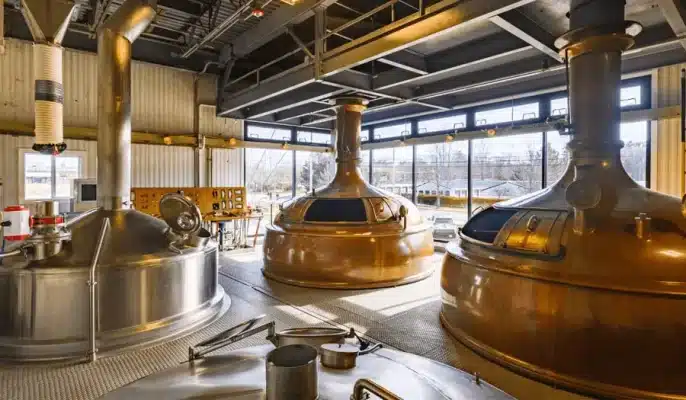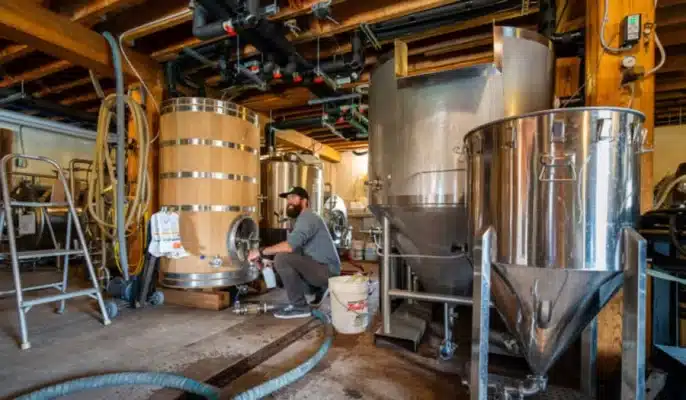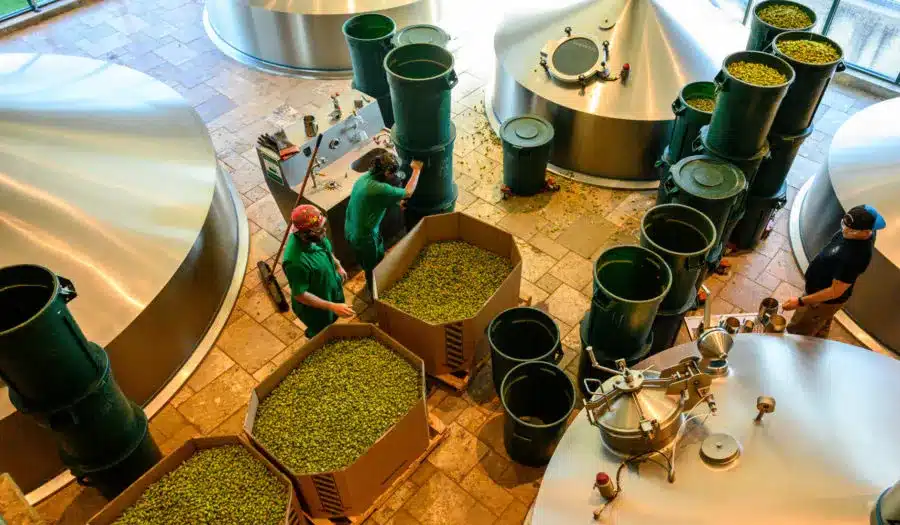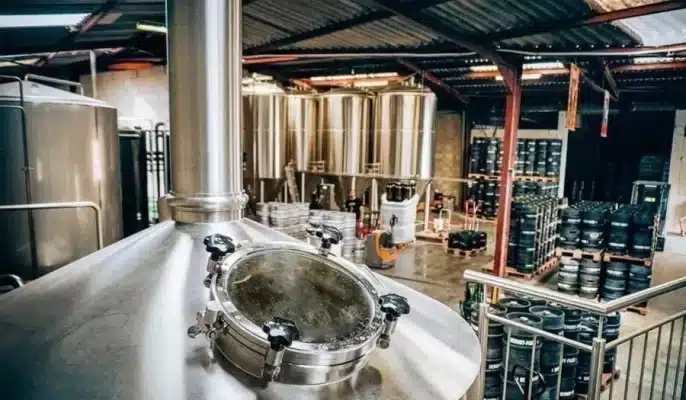Beer is one of the most popular beverages in the world, and its production process involves complex links. The brewing efficiency of the brewery directly affects product quality, production cost, and market competitiveness. Therefore, the brewing efficiency of the brewery is an important issue that people are concerned about. This article will explore various techniques to improve the brewing efficiency of the brewery and focus on analyzing the importance of brewery brewing equipment.
The basic process of beer brewing
The basic process of beer brewing includes several key steps, as follows:
- Malt preparation: soak barley in water, germinate, and process it to make malt.
- Mash: grind the malt, add water, and heat it to convert starch into sugar.
- Filtration: produce mashliquid (wort) and residue.
- Boiling: boil the wort and add hops to add flavor and preservatives.
- Fuel: quickly cool the boiled wort to fermentation temperature.
- Fermentation: add yeast to ferment and produce alcohol and alcohol.
- Maturation: store at a low temperature for some time to make the alcohol more concentrated.
- Filtration and bottling: filter the wine and bottle it.

Why should we improve breweries’ brewing efficiency?
- Reduce costs: Improving brewing efficiency can reduce the waste of raw materials (such as malt, hops, and water), thereby reducing production costs.
- Increase production: By optimizing processes and procedures, breweries can produce more beer at the same time to meet market demand.
- Improve quality: Higher brewing efficiency often means more precise control of the process, reducing the generation of defects and substandard products, thereby improving the quality of the final product.
- Save time: Optimizing the brewing process can shorten the production cycle, allowing beer to be put on the market faster and seize market opportunities.
- Resource utilization: Improving brewing efficiency can make more effective use of resources such as water and electricity, reduce environmental burden, and help achieve sustainable development.
Importance of beer brewing equipment in improving brewing efficiency
Brewhouse equipment
Mash is an important part of beer brewing, and the nature of mash equipment has an important influence on the overall weaving efficiency. The mash equipment in brewing has the characteristics of high automation, which can realize the automatic control of multiple parameters such as temperature and moisture, and ensure the stability of the mash process.
Boiling equipment
Boiling is a key step in beer manufacturing, and the acceleration performance of the boiling equipment is directly related to the flavor of the product. The boiling equipment should have good heating uniformity to ensure that the components in the wort react fully and produce the best flavor. After boiling, it is very necessary to cool the wort quickly. Advanced cooling equipment can reduce the wort temperature to a suitable level for fermentation in a short time.
Matériel de filtration
After mash, the wort contains a large amount of solid particles, and the efficiency of the filtration equipment affects the subsequent boiling process. The use of filters can reduce the filtration time, improve the filter effect, and reduce the turbidity of high-efficiency wort. Modern filtration equipment is usually equipped with an online cleaning function, which can reduce the cleaning time and improve production efficiency.
Cuve de fermentation
The fermentation tank is a very critical equipment in beer brewing, and its design directly affects the efficiency and quality of fermentation. Efficient fermentation tanks need to be equipped with advanced temperature control systems to optimize the activity of beer by precisely controlling the fermentation temperature to ensure the production of alcohol and flavor substances. A good stirring system can ensure the uniform distribution of yeast in the fermented liquid and avoid the problem of uneven fermentation.
Bottling and packaging equipment
Packaging is the last step in beer production. Bottling and packaging equipment can effectively and efficiently improve production efficiency. Modern automatic bottling equipment can achieve safe and fast operation, effectively saving labor costs.

Tips for Improving Brewing Efficiency in Your Brewery
Improve your grain grinding process
How well your grain is ground has a big impact on the efficiency of your wort and wort. The grain should be ground very finely, but the husk should be left mostly intact when ground to act as a filter bed. A double roller mill, such as a barley mill, is ideal for this purpose. Be aware that if you grind your grain too finely, you will clog the filter bed, causing “wort plugging.” If the wort is plugged, the filter bed will clog and the wort will stop flowing.
Mash or flush with hot water
Using hot water during the mash and flush will help thick wort flow more freely. Ideally, you want to raise the mash temperature to about 168F and then flush with 168F water. You can use a mash soak additive to help raise the mash temperature while flushing.
Rinse slowly
Most beginners try to flush their wort too quickly. Flushing too quickly does not give the hot water enough time to extract the sugars in the grain bed. Limit the outflow from the wort tun to just above a trickle. A complete flush of a 5-gallon all-grain batch (about 6 gallons of wort) should take 30-50 minutes.
Reduce Losses in the System
Losses anywhere in the brewing system, including dead zones in the wort tub, transfer lines, pumps, and trub at the end of the wort, contribute to wort losses. Wort carries sugars with it, which reduces the overall efficiency of the brewery. Use an appropriately sized wort tub and work to eliminate dead zones in the system.
Choose a Properly Designed Wort Tub
The design of the wort tub and false bottom or screen has a big impact on the efficiency of the wort process. A round cylindrical wort tub is generally considered best because it keeps the depth of the grain bed approximately equal to its width. This is one reason cylindrical water coolers are popular. A false bottom is best to cover the entire bottom of the wort tub but with minimal dead space underneath it. This provides even flow across the entire grain bed, which improves efficiency.
FAQ
How to reduce the waste of raw materials in the production process?
Use accurate metering equipment and regularly check the amount of raw materials used. Implement a closed-loop system to recycle undeveloped substances and waste for reuse.
How to improve the efficiency of the fermentation process?
Regularly monitor and optimize fermentation temperature and conditions to match the characteristics of different yeasts. Select yeast strains suitable for the target product that can ferment quickly and produce the desired flavor.
What technologies can improve brewing efficiency?
Consider using automation and control systems to improve process controllability and consistency. Use heat exchangers to improve thermal energy utilization and reduce energy consumption.
How to reduce cleaning and equipment downtime?
Implement a CIP (cleaning in place) system to reduce cleaning time and improve work efficiency. Consider easy cleaning when designing equipment and pipelines to reduce maintenance difficulty.





